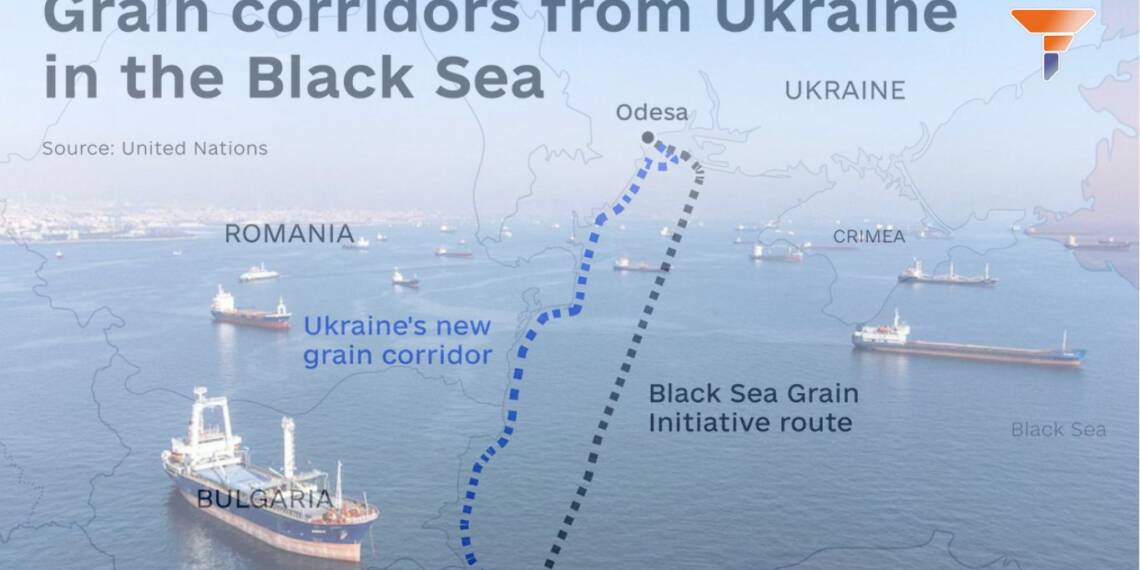On Tuesday (March 26), after three days of talks between Russia and the US in Riyadh, Russia and Ukraine reached a naval ceasefire in the Black Sea. The White House said in a statement that Kyiv and Moscow had agreed “to ensure safe navigation, eliminate the use of force, and prevent the use of commercial vessels for military purposes in the Black Sea”.
Previously, Russia and Ukraine agreed not to attack each other’s energy infrastructure. The US said It would also look for ways to enforce a ceasefire on energy infrastructure in the two countries.
The Naval Ceasefire in the Black Sea has been considered extremely important in order to maintain trade and the movement of ships for global goods. Trump’s delegation successfully persuaded Russia to accept the naval ceasefire but had to offer more concessions.
The Black Sea Deal
Russia and the US agreed on multiple agreements; the Black Sea deals talk about the safe navigation of ships and goods in the Black Sea. According to Ukrainian President Volodymyr Zelenskyy, “We first agreed that there could be silence at sea and free navigation. The second point is to stop attacks on the energy system.”
Just after the agreement was signed in Riyadh, Ukrainian officials said Ukraine immediately stopped “deep strikes” on each Russian target under the deal. However, Vladimir Putin said the new ceasefire deal would only come into place when international sanctions on Russia are lifted. The Kremlin demanded an end to restrictions on the Russian Agricultural Bank and other “financial institutions involved in international trade of food“, and only after they are reconnected to the SWIFT international payment system.
According to the ceasefire deal, “not only ships” but Ukrainian ports were also included in the maritime ceasefire. Odesa and other Black Sea ports have continued to be struck by Russian missiles and drones in recent days. Another aspect of the Black Sea deal is that the US will remain committed to returning forcibly transferred Ukrainian children.
Notably, this deal is a return to the previous Black Sea agreement, signed in 2022, while allowed for the safe passage of commercial ships. Russia withdrew from it in the following year, complaining that its own food and fertilizer exports faced serious obstacles.
As Russia mentioned, Turkey, which has maintained ties with both sides, could monitor the situation on the Black Sea and allow a West Asian nation to look at the energy agreement.
The White House said it would “help restore access to the world market” for Russian agricultural and fertilizer exports. It’s important to note that while Washington hadn’t imposed sanctions on Russian agriculture, it had cut off access to the main international payment gateway, SWIFT.
However, Zelenskyy described this as a “weakening of positions”. The Guardian explains that this is because it appears to suggest that Washington would help Russia improve its economic position while the land and air war continued.
Also Read: Russia Launches Deadly Drone Attack on Kyiv Ahead of Ceasefire Talks
Impact of the Black Sea Deal
Free navigation in the Black Sea is important due to its role in global trade, energy transportation, and regional stability. The war between Russia and Ukraine has disrupted the trade and transportation of food and energy, which has led to a dwarf of regional trade, which has affected regionally and globally. The Black Sea is necessary for the movement of food, fertilizer and fuel. After the war started, the decline in port operations and overall trade of grain was hampered by 3.8 percent. The disturbance in the sea affected the overall maritime logistics and connectivity in the region.
The recent deal reached in Riyadh aims to ensure safe passage in this critical waterway to reopen the region’s robust maritime logistics and connectivity. An increase in the movement of food, fertilizer, and fuel will help the globe reduce economic distress, especially if it may help decrease inflation a bit worldwide.
In the area of energy transportation, if the deal gets implemented, it will facilitate the transport of oil and gas, which is essential for energy security in Europe and beyond.
Chances of success
Though the deal is not going to change anything substantial at the battleground between Russia and Ukraine, it is a positive step towards peace. For Russia, this will provide them the confidence that they can focus only on fewer battlefields. For the US, it’s a win-win situation, where they are moving towards peace as Trump has promised during his election campaign. For Ukraine, it limits their options, but at least they can start exporting grains to the world.
According to the experts, the deal may not be effective as any sanction relief on Russia would depend on Europe taking similar steps, which seem unlikely at the moment. As Kimberly Donovan, director of the Economic Statecraft Initiative at the Atlantic Council’s GeoEconomics Center told Atlantic Council, “If the terms that were agreed to are dependent on the lifting of sanctions, the United States needs to coordinate with its G7 coalition partners and seek their agreement on the collective way forward.” Only time will tell the effectiveness of the Black Sea Deal.








